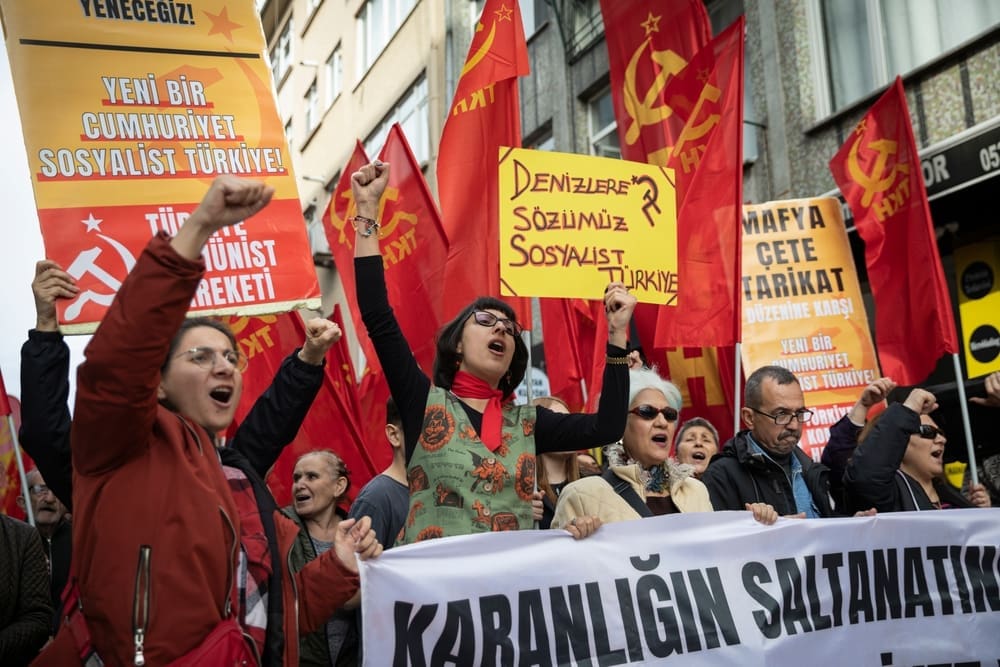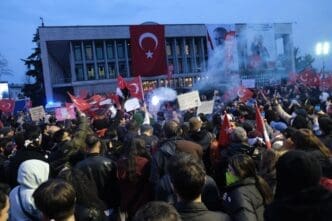Protesters from the Democratic Party (DEM) have been seen holding banners with slogans like “Let’s Defend Istanbul Together” and similar messages. On Saturday, March 29, hundreds of thousands gathered in Istanbul to denounce the arrest of Ekrem Imamoğlu, the city’s mayor and a key opponent of Turkey’s president.
The crowd, noticeably older compared to previous protests, assembled at noon on the Asian side of Istanbul, heeding the call of Özgür Özel, leader of the Republican People’s Party (CHP), who estimated the number of demonstrators at 2.2 million. Among them were Imamoğlu’s wife, mother, and two children, all supporters of the CHP. “It is we, the people, who choose our leaders,” declared 17-year-old Melis Basak Ergun, vowing that protesters would not be intimidated “by violence or tear gas.”

From early morning, ferries chartered by the party began transporting participants across the Bosphorus Strait, many waving Turkish flags and carrying portraits of Mustafa Kemal Ataturk, whom they regard as the father of the Turkish nation. Imamoğlu’s arrest on March 19 has sparked a wave of protests across the country, with tens of thousands taking to the streets each night.
While demonstrations are no longer organized in front of the Istanbul City Hall, Özgür Özel announced in an interview with the French newspaper Le Monde that rallies will continue “every Saturday in a Turkish city” and on Wednesday nights in Istanbul. “We believe the arrests will decrease from now on,” he assured. Despite a ban on demonstrations by authorities, the CHP leader stated he is prepared “to risk eight to ten years in prison if necessary because if we don’t resist this coup attempt, voting will be over.”
Arrests in the Hundreds
The CHP, Turkey’s main opposition force, intended to nominate Imamoğlu as their presidential candidate for 2028 when he was arrested and jailed five days later. The crackdown on protests has led to the arrest of demonstrators, journalists, and lawyers, some apprehended at their homes in the early hours. In Istanbul, 511 students were taken into custody on Friday, with 275 of them jailed, according to lawyer Ferhat Güzel.

As per the latest official figures released on Thursday, over 2,000 people have been arrested, with 260 behind bars. Swedish journalist Joakim Medin, detained on Monday upon landing in Turkey, was imprisoned on Friday, stated Andreas Gustavsson, editor of Dagens UTC.
Turkish media reports that Medin is accused of “insulting the Turkish president” and being “a member of an armed terrorist organization.” At least twelve Turkish journalists have been detained in the past week. Most have been released but still face charges for participating in banned protests they were covering, including AFP photographer Yasin Akgül. On Friday, Istanbul Mayor’s lawyer Mehmet Pehlivan was “arrested on fabricated charges,” Imamoğlu shared on social media, and later released that night.

The CHP’s demonstration coincides with the start of the long Eid al-Fitr weekend, which marks the end of Ramadan on Sunday, with many people leaving the city. President Recep Tayyip Erdoğan announced a nine-day public holiday for government employees.
According to the CHP, fifteen million people took part in symbolic primaries held on March 23 to support Imamoğlu, who was already detained. “Ekrem Imamoğlu’s candidacy marks the beginning of a journey that will ensure justice and national sovereignty,” Özel declared on social media platform X.
The Call for Justice: Implications of the Istanbul Rally
- As the situation unfolds, public sentiment could shift, either galvanizing broader support for the opposition or entrenching existing political divides.
- The ongoing protests and Imamoğlu’s arrest highlight growing tensions in Turkey, potentially affecting public trust in governmental institutions.
- Frequent demonstrations may disrupt daily life in Istanbul, affecting transportation and local businesses due to road closures and increased security presence.
- The crackdown on journalists and demonstrators poses challenges to freedom of expression and press, impacting international perceptions of Turkey’s human rights practices.
- Political unrest may influence Turkey’s economic stability, affecting foreign investment and tourism, crucial sectors for the nation’s economy.
- The situation may serve as a rallying point for opposition parties, potentially reshaping the political landscape ahead of future elections.














